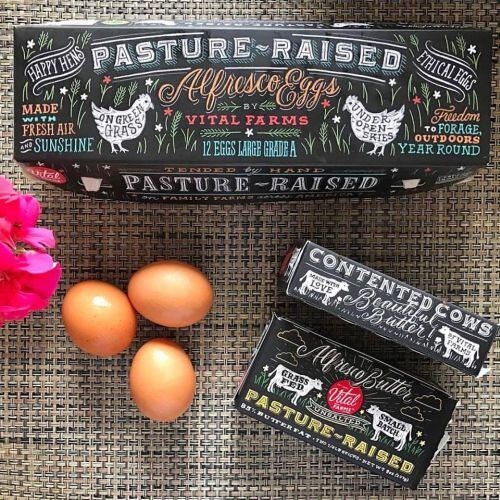While the plethora of different claims on egg packaging can be bewildering, there are big differences between ‘pasture-raised’ eggs, which in the case of Vital Farms, come from hens given 108 square feet of unrestricted outdoor access; and ‘cage-free’ eggs, which are from uncaged hens kept inside cramped barns with no access to the outdoors; ‘free-range’ eggs – which are often from hens kept in barns with equally limited space and limited access to the outdoors; and ‘organic’ eggs – from hens kept free of antibiotics and hormones, fed organic feed, and living free range, but often with limited space and access to the outdoors.
And even within the pasture-raised arena, not every supplier is adhering to the same standards, noted Vital Farms founder Matthew O’Hayer: “With a space allotment of 108sqft per bird on rotated pastures, the grass and bugs that our girls forage for form an essential part of their diet. Any less space than that is simply not enough for this to be true. So while you may see other farms claiming pasture-raising, without the Certified Humane shield, and the measure of space that’s required to carry that shield, it’s not true pasture-raising."
He told FoodNavigator-USA: "Right now, pasture-raised accounts for about 1% of the market in the US, but it's more than 50% in the UK [where 'free-range' effectively means pasture-raised], so I think that once consumers understand what cage-free really means, they will make the switch.
"I think of going from caged to cage free as being like going from a crowded elevator with a four-foot ceiling to a mosh pit in a rock concert. It's just not much better. I always tell people that we're not just in the farming business or the animal welfare business, we're in the education business. It wasn't so long ago that no one ever thought about this at all. An egg is an egg. But that's changing very rapidly."
Cage-free? Free-range? Pasture-raised? Click HERE to read the American Egg Board’s guide to egg terminology
When consumers understand the differences between pasture raised and other claims, they will make the switch

Steve Hughes, Sunrise Strategic Partners co-founder and CEO, added: “As a result of Matt’s vision and perseverance, Vital Farms created the category of ‘pasture raised’ and has established the first-ever scalable and sustainable pastured farming model with over 100 independent family farms in six states.
“We believe that once the consumer understands the difference pasture-raised eggs provides they will switch to Vital Farms and never look back.”
The cash injection from Sunrise will allow Vital Farms to continue to support its network of family farmers and invest in infrastructure to help bring prices down.
Humane Farm Animal Care’s (HFAC’s) Certified Humane 'pasture-raised' standard (see p18) is 1,000 birds per 2.5 acres (108 sq. ft. per bird) and the fields must be rotated. The hens must be outdoors year-round, with mobile or fixed housing where the hens can go inside at night to protect themselves from predators, or for up to two weeks out of the year, due only to very inclement weather.
Are pasture raised eggs more nutritious?
By eating wild grasses and bugs, hens laying eggs for Vital Farms consume more vitamins and minerals than they would on a corn-based feed alone, claims the company, which says independent tests show that its eggs contain less saturated fat and cholesterol, and more vitamin A, D and E, folic acid, omega-3 fatty acids, and beta carotene than conventional eggs.
This marks the seventh investment for Boulder, Colorado-based Sunrise Strategic Partners, which was co-founded by Steve Hughes and Trilantic North America, and provides growth capital and expertise to early stage health and wellness brands.
Its portfolio currently includes Vital Farms, Pure Growth Organic, Perky Jerky, Kodiak Cakes, Maple Hill Creamery, Pact Organic and Teton Waters Ranch.
